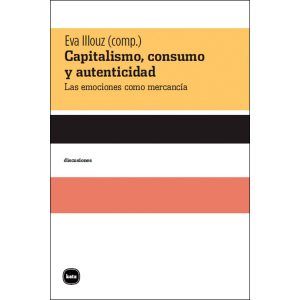

Ex Libris
Capitalismo, consumo y autenticidad, by Eva Illouz et altri
05/27/2021|
5 mins
A text to read without emotions

|
No. of pages:
|
288 |
| Publisher: | Katz |
| Language: | Español |
| ISBN: | 9788415917397 |
| Año de edición: | 2019 |
| Year of publication: | 2019 |
| Place of publication: | Madrid |
| Where to buy: | Casa del Libro |
In two sentences:
"(It's key) to know how to build the relaxation experience that we naturally associate with holidays" "The production of successful emotions in cinema is the main ingredient to guarantee its success"
In less than 500 characters:
This text addresses the issue of emotions, key to contemporary strategy and innovation, from a surprising, critical and extremely inspiring perspective.
Why I should read it:
First, a warning: It is not an easy text. Unlike other books we recommend in ExLibris, this text requires full concentration and a notebook:
- Concentration because it is written by academics for academics, and they do not shy away from using complex language, as well as assuming that you have read all the texts they quote in the work.
- A notebook for capturing the ideas that interest us, so we do not miss anything. The text is a disparate collection of essays that deal with very different topics. If you do not note it down in the moment, the book does not offer any summaries.
There are texts that need to be read with an open mind, being very aware that one should not seek to reaffirm what one thinks, but rather confront different ideas and points of view. This is one of them.
4 Stimulating ideas:
- The book’s core hypothesis is based on the affirmation that “consumer acts and emotional life have become closely and inseparably intertwined with each other, each one defining and enabling the other”. This is how the essay by the book’s editor Eva Illouz (Morocco, 1961) begins. A challenging and intriguing hypothesis that the text unpacks in all the essays, each written by a different researcher.
- The book covers some of the major contemporary cultural industries (cinema, music, tourism), and uses them as an example of how emotions are manufactured, communicated and integrated into consumer discourses.
- The editor “invents” the word “emodity” to talk about commodified emotions. For Illouz, an “emodity” is the point at which emotions and consumer acts coincide. Some of the authors of the text use this term in their theses in a very enriching way.
- In addition to the above, the first of the essays, on tourism, and the one on the commercialisation of explicit seduction, are particularly recommendable. The other chapters are also interesting, although with a view to strategy and innovation, they may be somewhat less inspiring.
If you like this text, you might also like:
The Experience Economy, by Pine & Gilmore (2011)
The Catch by The Hunter
This article comes from The Catch, The Hunter's strategic inspiration tank. Register with The Catch to access and receive all its content.
Subscribe now
I'm interested in for my brand
If you would like to know how 15 years of research and mapping enable us to make strategic recommendations that are innovative and relevant, write to us and we'll get In touch for a chat.
Tell me more